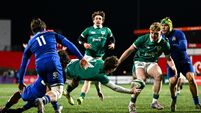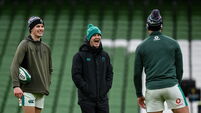Even Johnson’s retirement showed immaculate timing
In the two months since this season’s competition, a quartet of Six Nations captains have seen fit to call it a day - Bryan Redpath, Fabien Galthie and Keith Wood had all retired from the international stage. Last Saturday, England’s triumphant leader Martin Johnson followed suit. While some in Ireland may quibble, Johnson’s departure will have the biggest impact on a global basis.
Throughout his career, Johnson has displayed an impeccable sense of timing. Very much his own man, Johnno has departed on his own terms. It is fitting that one of the truly great international second row forwards has bowed out at the height of his career. His performance in the World Cup final itself was arguably his greatest game in an England shirt.
As a captain, his achievements will be impossible to surpass. Besides leading England to World Cup and Grand Slam glory over the last twelve months, he is the only man to captain the British and Irish Lions on two tours. In addition, he has led Leicester to two European Cups, and four premier league titles.
Johnson is not everybody’s cup of tea; nobody appreciates this more than himself. His disciplinary record ensured he has never been flavour of the month with officialdom. High profile incidents against Justin Marshall of New Zealand, Robbie Russell and Duncan McRae while playing for Saracens saw him in the headlines for all the wrong reasons. The RFU penalised him several times for indiscretions while captaining England.
Throughout his career Martin Johnson always displayed a tremendous will to win. Second place was no use to him. He is a very driven individual. I remember ringing to organise a meeting with him six months before the Lions Tour to Australia to get his views on certain issues. I spoke to his late mother, a lovely women and a great character. She made a comment about her son that stuck in my mind: “The one thing I’d say about my son is that he is as straight as an arrow.” How right she was. As an individual, he is uncomplicated, honest, has no pretensions and despite all his success, shuns the limelight.
There are times when he lives on the edge. In Lansdowne Road last March, we saw evidence of this first hand when President McAleese was famously forced to abandon the red carpet in order to greet the Irish players. Johnson was wrong. Yet it was clear from the faces of his English colleagues that his act of defiance set the ground rules for the game. The message was clear, ‘we don’t give an inch’. Given that England had lost the Grand Slam in each of the preceding three seasons, Johnson was prepared to do whatever it took. He would worry about the consequences later.
Over the years I have had the pleasure of touring with many English players. In my experience, they fell into two categories. The London based players, usually the backs, were always confident, slightly arrogant. Those from the midlands/west country were no different to ourselves. In the latter category, you had the likes of Wade Dooley, Dean Richards, Andy Robinson, Gareth Chilcott and Mike Teague. Martin Johnson was very much part of that school.
As a captain he was a man of few words, but when he spoke, people listened. He led by his presence, actions and deeds. As a player, his most remarkable achievement was to adapt to the changing nature of the game. The role of the second row forward has changed appreciably since he made his debut against France in 1993. In those days, his primary function was to win lineout ball, scrummage hard and compete aggressively in ruck and maul. The advent of lifting in the lineout changed the role significantly and more is now demanded both defensively and in broken play. Yet Johnson adapted seamlessly to such a degree that he was always in the top two locks in world rugby over a ten-year period. Whether against New Zealand or Japan, his commitment was always the same. Consistency was his hallmark.
He is also a man of great character. In Ravenhill last Sunday week, the home supporters consistently booed him as he warmed up as a substitute. On his introduction in the second half, the jeers grew louder. Yet when the game finished, despite a humiliating 33-0 defeat, he spent 25 minutes on the field signing autographs.
There is no doubt he will be sorely missed on the international stage. His defiance and bloody mindedness always make him interesting to watch. He is respected and admired most by those he played with and against. I expect this is the way he would want it.
One man who won’t be sorry to see the back of him is Eddie O Sullivan. With the Six Nations championship and Ireland’s trip to Twickenham looming large, it was a very good weekend for Ireland’s head coach.
Both Munster and Leinster showed a welcome return to form with some outstanding individual performances especially in the forwards. Yet, given Brian O Driscoll’s recent injury problems, the form of Mike Mullins and Gordon D’Arcy at outside centre would have pleased him most.
Connacht also achieved another significant milestone by qualifying for the Parker Pen quarter-final with such a young and inexperienced squad. Michael Bradley has done a fine job since his appointment in the west.
The only blemish was Ulster’s complete capitulation in Leicester. For some time now their away form has been woeful. It is quite remarkable that they have never won a Heineken Cup match in England. As a result of their troubles on the road, they are now likely to miss the quarter-final stages for the fourth year in a row.
Of slight concern to Alan Gaffney will be the scoring feats of Treviso over the last two weeks when they scored eight tries against Bourgoin. Munster must be fully focused in defence on Saturday, or could be in trouble. After the heroics in Thomond Park last weekend that would be a disaster.
Surely, they are too professional to allow that to happen.





